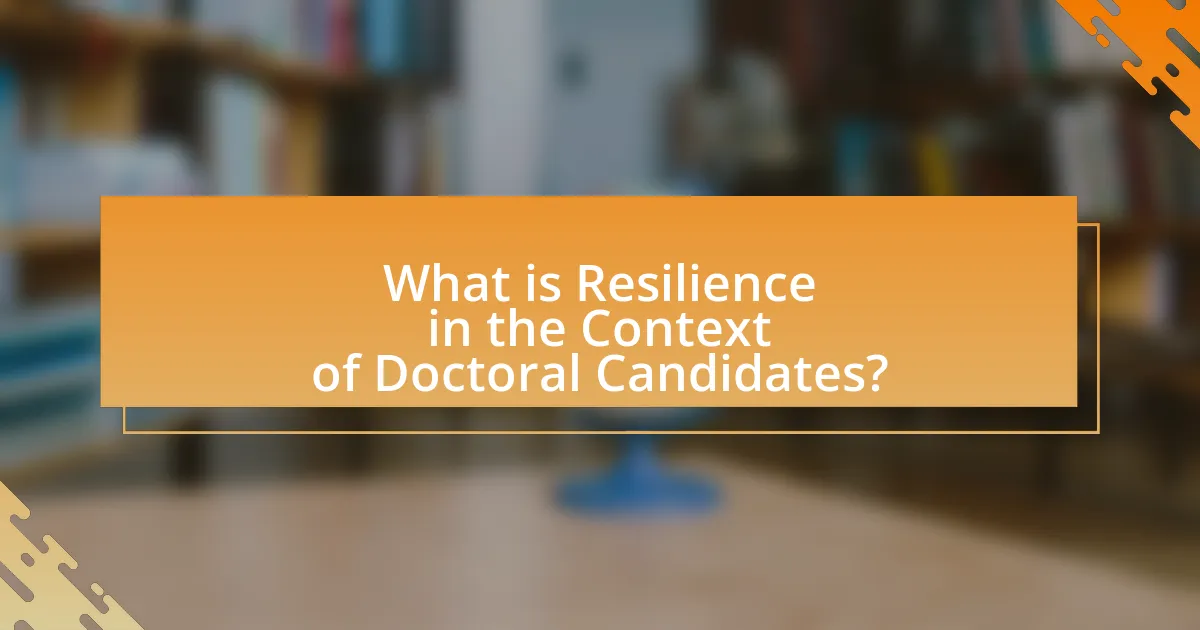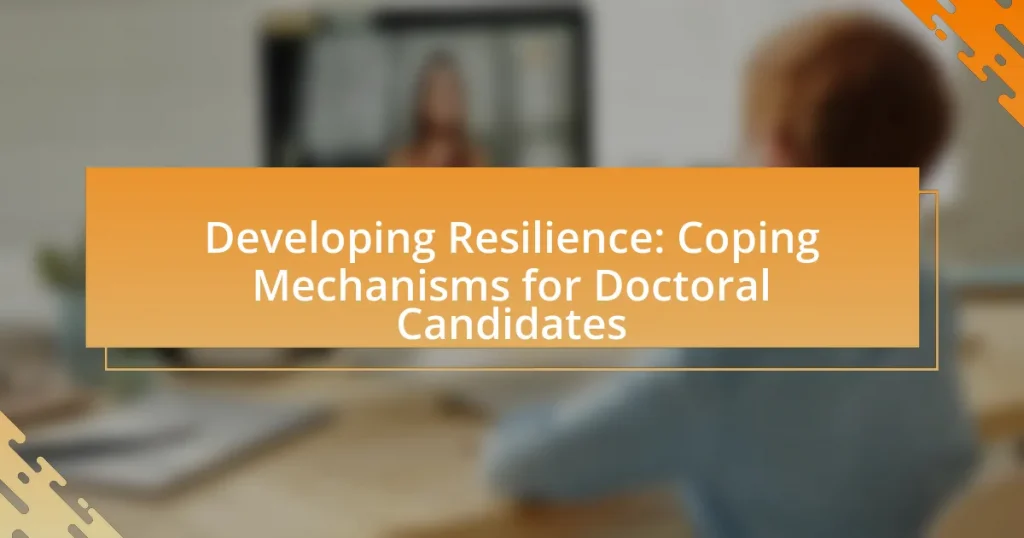Resilience is defined as the ability of doctoral candidates to adapt to challenges and setbacks encountered during their studies. This article explores the significance of resilience in the doctoral journey, highlighting its impact on academic performance and mental well-being. Key characteristics of resilient candidates include adaptability, perseverance, and a strong support network. The article also discusses the challenges faced by doctoral candidates, such as academic pressure and isolation, and outlines effective coping mechanisms, including mindfulness practices and social support. Additionally, it emphasizes the role of institutional resources and mentorship in fostering resilience among doctoral candidates.

What is Resilience in the Context of Doctoral Candidates?
Resilience in the context of doctoral candidates refers to their ability to adapt to challenges, setbacks, and stressors inherent in the rigorous demands of doctoral studies. This adaptability is crucial as doctoral candidates often face obstacles such as research difficulties, time management issues, and emotional stress. Studies indicate that resilient doctoral candidates are more likely to persist in their programs and achieve their academic goals, as they employ effective coping strategies and maintain a positive outlook despite adversity. For instance, research published in the “Journal of Higher Education” highlights that resilience is linked to better academic performance and mental well-being among graduate students, demonstrating its significance in the doctoral journey.
How is resilience defined for doctoral candidates?
Resilience for doctoral candidates is defined as the ability to adapt to challenges, maintain motivation, and recover from setbacks throughout the demanding process of earning a doctorate. This definition encompasses emotional strength, perseverance, and the capacity to navigate academic pressures, which are critical for success in a rigorous educational environment. Research indicates that resilient doctoral candidates are more likely to complete their programs and achieve their academic goals, as they effectively manage stress and seek support when needed.
What are the key characteristics of resilient doctoral candidates?
Resilient doctoral candidates exhibit adaptability, perseverance, and a strong support network. Adaptability allows them to navigate challenges and changes in their research environment effectively. Perseverance is crucial as it enables them to maintain motivation and focus despite setbacks, which is supported by studies indicating that persistence is a significant predictor of doctoral success. A strong support network, including mentors and peers, provides emotional and academic assistance, reinforcing their resilience. These characteristics collectively contribute to their ability to overcome obstacles and achieve their academic goals.
Why is resilience important for success in doctoral programs?
Resilience is crucial for success in doctoral programs because it enables candidates to effectively navigate the challenges and setbacks inherent in advanced academic research. Doctoral candidates often face rigorous demands, including complex coursework, research obstacles, and the pressure of deadlines, which can lead to stress and burnout. Studies indicate that resilient individuals are better equipped to cope with these stressors, maintain motivation, and adapt to changing circumstances. For instance, research published in the Journal of Educational Psychology highlights that resilience positively correlates with academic performance and persistence in graduate studies, demonstrating that resilient students are more likely to complete their programs successfully.
What challenges do doctoral candidates face that require resilience?
Doctoral candidates face several challenges that require resilience, including intense academic pressure, isolation, and the uncertainty of research outcomes. The academic pressure stems from high expectations for original contributions to knowledge, often leading to stress and burnout. Isolation occurs due to the solitary nature of research work, which can result in feelings of loneliness and disconnection from peers. Additionally, the uncertainty of research outcomes can create anxiety, as candidates may encounter setbacks or failures in their experiments or studies. These challenges necessitate resilience to navigate the demanding journey of completing a doctoral program successfully.
How do academic pressures impact doctoral candidates’ mental health?
Academic pressures significantly impact doctoral candidates’ mental health by increasing stress, anxiety, and feelings of isolation. Research indicates that the demanding nature of doctoral programs, characterized by high expectations, tight deadlines, and the pressure to publish, can lead to mental health issues such as depression and burnout. A study published in the journal “Nature Biotechnology” found that nearly 40% of PhD students reported experiencing psychological distress, highlighting the prevalence of mental health challenges in this population. Furthermore, the lack of social support and the competitive environment exacerbate these issues, making it crucial for institutions to implement support systems to help candidates cope effectively.
What role does isolation play in the resilience of doctoral candidates?
Isolation can significantly impact the resilience of doctoral candidates by fostering both challenges and opportunities for personal growth. While isolation often leads to feelings of loneliness and stress, it can also provide candidates with the necessary space to engage deeply with their research, enhancing their focus and self-discipline. Studies indicate that periods of solitude can facilitate critical thinking and creativity, essential components in the doctoral journey. For instance, research published in the Journal of Higher Education found that candidates who learned to navigate isolation effectively reported higher levels of resilience and adaptability in their academic pursuits. Thus, while isolation presents difficulties, it can also serve as a catalyst for developing resilience among doctoral candidates.
How can resilience be developed among doctoral candidates?
Resilience among doctoral candidates can be developed through structured support systems, effective coping strategies, and fostering a growth mindset. Research indicates that mentorship programs significantly enhance resilience by providing guidance and emotional support, which helps candidates navigate challenges (Baker & Pifer, 2011). Additionally, implementing stress management techniques, such as mindfulness and time management training, equips candidates with tools to handle academic pressures effectively. Studies show that candidates who adopt a growth mindset, viewing challenges as opportunities for learning, demonstrate higher resilience levels (Dweck, 2006). These approaches collectively contribute to building resilience in doctoral candidates, enabling them to thrive in demanding academic environments.
What coping mechanisms are effective for building resilience?
Effective coping mechanisms for building resilience include mindfulness practices, social support, and cognitive restructuring. Mindfulness practices, such as meditation and deep-breathing exercises, help individuals manage stress and enhance emotional regulation, which is crucial for resilience. Social support from peers, mentors, and family provides emotional and practical assistance, fostering a sense of belonging and reducing feelings of isolation. Cognitive restructuring involves reframing negative thoughts into positive ones, which can improve problem-solving skills and promote a more optimistic outlook. Research indicates that these mechanisms significantly contribute to resilience, as evidenced by studies showing that individuals who engage in mindfulness report lower stress levels and higher emotional well-being.
How can mentorship contribute to resilience in doctoral candidates?
Mentorship significantly contributes to resilience in doctoral candidates by providing emotional support, guidance, and practical advice during challenging times. This relationship helps candidates navigate the complexities of their research and academic environment, fostering a sense of belonging and reducing feelings of isolation. Research indicates that mentorship can enhance coping strategies, as mentors often share their own experiences and strategies for overcoming obstacles, which can empower candidates to develop their own resilience. For instance, a study published in the “Journal of Higher Education” found that doctoral candidates with mentors reported higher levels of resilience and lower levels of stress, highlighting the positive impact of mentorship on their ability to cope with academic pressures.

What are Effective Coping Mechanisms for Doctoral Candidates?
Effective coping mechanisms for doctoral candidates include time management, seeking social support, practicing mindfulness, and engaging in physical activity. Time management helps candidates prioritize tasks and reduce stress, as evidenced by research indicating that structured schedules can enhance productivity and well-being. Seeking social support from peers and mentors provides emotional relief and practical advice, which studies show can mitigate feelings of isolation and anxiety. Mindfulness practices, such as meditation, have been linked to improved focus and reduced stress levels, supported by findings from psychological research. Lastly, regular physical activity is proven to boost mood and cognitive function, with studies demonstrating its positive impact on mental health among students.
What types of coping strategies can doctoral candidates employ?
Doctoral candidates can employ various coping strategies, including time management, social support, mindfulness practices, and cognitive restructuring. Time management techniques help candidates prioritize tasks and reduce feelings of overwhelm, which is crucial given the demanding nature of doctoral studies. Social support from peers, mentors, and family provides emotional and practical assistance, fostering a sense of community and reducing isolation. Mindfulness practices, such as meditation and deep breathing, enhance emotional regulation and focus, contributing to overall well-being. Cognitive restructuring involves challenging negative thought patterns and replacing them with more positive, realistic perspectives, which can mitigate stress and anxiety. These strategies are supported by research indicating that effective coping mechanisms can significantly improve mental health outcomes for graduate students.
How do problem-focused coping strategies work?
Problem-focused coping strategies work by directly addressing and managing the source of stress or challenges. These strategies involve identifying the problem, generating potential solutions, and implementing those solutions to mitigate the stressor. Research indicates that individuals who utilize problem-focused coping are more likely to experience reduced anxiety and improved outcomes in stressful situations, as they actively engage with the issues at hand rather than avoiding them. For example, a study published in the Journal of Counseling Psychology found that doctoral candidates who employed problem-focused strategies, such as time management and seeking academic support, reported higher levels of academic resilience and lower levels of burnout.
What are the benefits of emotion-focused coping strategies?
Emotion-focused coping strategies provide several benefits, including enhanced emotional regulation, reduced psychological distress, and improved overall well-being. These strategies allow individuals to manage their emotional responses to stressors rather than attempting to change the stressor itself. Research indicates that effective emotion-focused coping can lead to lower levels of anxiety and depression, as individuals learn to process and express their emotions in a healthy manner. For instance, a study published in the Journal of Health Psychology found that individuals who utilized emotion-focused coping reported higher life satisfaction and better mental health outcomes compared to those who relied solely on problem-focused strategies.
How can mindfulness and self-care practices enhance resilience?
Mindfulness and self-care practices enhance resilience by promoting emotional regulation and reducing stress. Engaging in mindfulness techniques, such as meditation and deep breathing, helps individuals become more aware of their thoughts and feelings, allowing them to respond to challenges with greater clarity and composure. Research indicates that mindfulness can lead to a 30% reduction in stress levels, which directly contributes to improved resilience. Additionally, self-care practices, including regular physical activity and adequate sleep, support mental health and bolster the ability to cope with adversity. Studies show that individuals who prioritize self-care report higher levels of resilience, as they are better equipped to manage the demands of their environment.
What mindfulness techniques are beneficial for doctoral candidates?
Mindfulness techniques beneficial for doctoral candidates include meditation, deep breathing exercises, and mindful walking. Meditation helps improve focus and reduce stress, which is crucial for managing the demands of doctoral studies. Research indicates that regular meditation practice can enhance cognitive flexibility and emotional regulation, aiding in academic performance. Deep breathing exercises promote relaxation and can lower anxiety levels, allowing candidates to approach their work with a clearer mind. Mindful walking encourages candidates to engage with their surroundings, fostering a sense of presence and reducing feelings of overwhelm. These techniques collectively support resilience and well-being in the challenging environment of doctoral education.
How does physical health impact mental resilience in doctoral studies?
Physical health significantly impacts mental resilience in doctoral studies by influencing cognitive function, stress management, and emotional stability. Research indicates that regular physical activity enhances brain health, improves mood, and reduces anxiety, which are crucial for maintaining resilience during the demanding nature of doctoral programs. For instance, a study published in the Journal of Health Psychology found that individuals who engage in consistent exercise report higher levels of psychological well-being and lower levels of stress. This connection underscores the importance of physical health as a foundational element that supports mental resilience, enabling doctoral candidates to cope more effectively with academic pressures and challenges.

What Resources and Support Systems are Available for Doctoral Candidates?
Doctoral candidates have access to various resources and support systems, including academic advising, mental health services, peer support groups, and professional development workshops. Academic advising provides guidance on research and coursework, while mental health services offer counseling and stress management resources. Peer support groups foster community and shared experiences among candidates, and professional development workshops enhance skills relevant to academic and career advancement. These resources are essential for promoting resilience and coping mechanisms during the demanding doctoral journey.
What institutional resources can support resilience in doctoral candidates?
Institutional resources that can support resilience in doctoral candidates include mental health services, academic advising, peer support groups, and professional development workshops. Mental health services provide counseling and stress management resources, which are crucial for coping with the emotional challenges of doctoral studies. Academic advising offers personalized guidance on navigating program requirements and research challenges, helping candidates feel more supported in their academic journey. Peer support groups foster a sense of community and shared experience, allowing candidates to discuss their struggles and strategies. Professional development workshops equip candidates with skills such as time management and effective communication, enhancing their ability to cope with the demands of their programs. These resources collectively contribute to building resilience among doctoral candidates, as evidenced by studies showing that access to support services correlates with improved mental health and academic success.
How can counseling services assist in developing resilience?
Counseling services assist in developing resilience by providing tailored support and coping strategies that enhance individuals’ ability to manage stress and adversity. Through techniques such as cognitive-behavioral therapy, counseling helps individuals identify negative thought patterns and replace them with positive, adaptive responses. Research indicates that individuals who engage in counseling report improved emotional regulation and increased problem-solving skills, which are critical components of resilience. For instance, a study published in the Journal of Counseling Psychology found that participants who received counseling demonstrated significant improvements in resilience scores compared to those who did not engage in such services. This evidence underscores the effectiveness of counseling in fostering resilience among individuals, particularly in high-stress environments like doctoral programs.
What role do peer support groups play in fostering resilience?
Peer support groups play a crucial role in fostering resilience by providing a safe space for individuals to share experiences and challenges. These groups facilitate emotional support, which has been shown to enhance coping strategies and reduce feelings of isolation among participants. Research indicates that individuals who engage in peer support are more likely to develop adaptive coping mechanisms, as they can learn from others’ experiences and gain practical advice. For instance, a study published in the Journal of Counseling Psychology found that peer support significantly improved resilience scores among graduate students facing academic stress. This evidence underscores the effectiveness of peer support groups in building resilience within the context of doctoral candidates.
How can doctoral candidates create their own support networks?
Doctoral candidates can create their own support networks by actively engaging with peers, faculty, and professional organizations. Building relationships with fellow students fosters a sense of community and shared experience, which is crucial for emotional support. Participating in academic conferences and workshops allows candidates to connect with professionals in their field, expanding their network beyond their immediate environment. Additionally, utilizing social media platforms and online forums dedicated to academic discussions can facilitate connections with others facing similar challenges. Research indicates that strong support networks contribute to higher levels of resilience and academic success among doctoral candidates, highlighting the importance of these connections in navigating the demands of their programs.
What strategies can be used to build a supportive community?
To build a supportive community, fostering open communication is essential. Open communication encourages members to share their thoughts and feelings, which strengthens relationships and trust. Research indicates that communities with high levels of communication report greater satisfaction and engagement among members. Additionally, organizing regular group activities, such as workshops or social events, can enhance connections and provide opportunities for collaboration. A study by the American Psychological Association found that social support networks significantly improve resilience, particularly in high-stress environments like doctoral programs. Lastly, establishing mentorship programs can provide guidance and support, helping individuals navigate challenges effectively.
How can networking contribute to resilience and coping?
Networking enhances resilience and coping by providing emotional support, resources, and shared experiences. Through connections with peers, mentors, and professionals, individuals can access advice and encouragement during challenging times, which is crucial for maintaining mental well-being. Research indicates that social support networks significantly reduce stress and improve coping strategies, as evidenced by a study published in the Journal of Health Psychology, which found that individuals with strong social ties reported lower levels of anxiety and depression. Thus, effective networking fosters a sense of belonging and community, essential for resilience in high-pressure environments like doctoral programs.
What are some practical tips for enhancing resilience as a doctoral candidate?
To enhance resilience as a doctoral candidate, it is essential to establish a strong support network. Engaging with peers, mentors, and faculty can provide emotional support and practical advice, which has been shown to reduce stress and improve academic performance. Additionally, practicing self-care through regular exercise, adequate sleep, and mindfulness techniques can significantly bolster mental health, as research indicates that physical well-being directly impacts cognitive function and emotional resilience. Setting realistic goals and breaking tasks into manageable steps also fosters a sense of accomplishment, which is crucial for maintaining motivation and perseverance throughout the doctoral journey.



